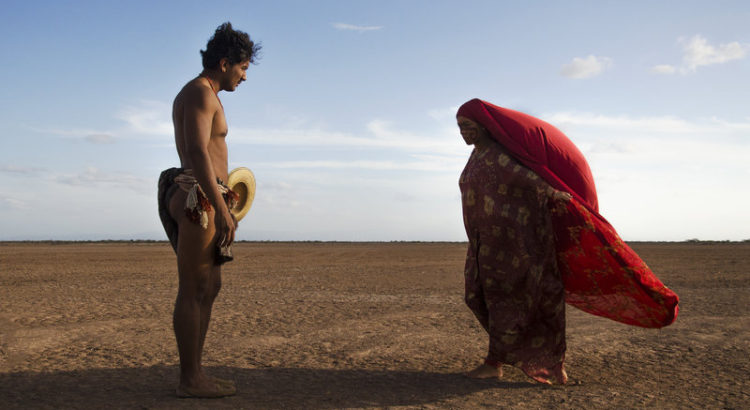The beginning of Ciro Guerra and Cristina Gallego’s Birds of Passage opens with a symbolism-laden new beginning: a young girl’s transition into adulthood. The Wayuu people at the center of the film celebrate this occasion with a festival of family, friends and dancing. But it is the dancing that provides the clearest window into the future of this sprawling clan. The daughter on the brink of womanhood, Zaida, is dancing the Yonna, a fast-paced give-and-take between her and another man. She is dressed in a flowing red garment, racing back and forth to the beat of a drum, the camera closely following their faces and imparting the dramatic feeling that you too are being chased in the circle, racing around and around in the ambiguous fear of what might happen if you stop. Her first partner, a young boy named Leonidas, eventually trips and falls to the ground. The dance stops, but not for long, as an outsider to the clan named Rapayet steps up and enters the fray, outlasting the drum, and making his first mark on the clan he will eventually join.
The clan is led by a powerful matriarch, Úrsula, who makes clear from the start that her power lies in her willingness to do anything to protect her family. Rapayet, a suitor intent on marrying Zaida, strikes Úrsula as a danger, but possibly even she does not realize the depth to which he will uproot her family and her culture. The Wayuu of northern Colombia had persevered through the rise of the modern nation by their adherence to their traditional practices that Úrsula is determined to protect. As Rapayet ventures into the marijuana trade to finance his dowry for Zaida, he finds himself sucked into a whirlpool of greed and desperation despite his best efforts to preserve the culture of honor. It is only a matter of time before the consequences manifest themselves.
Rapayet, Zaida, and their two children eventually move into a grand stucco villa in the middle of the barren desert, a visual metaphor for the isolation their wealth has granted them. The film is a deliberate exploration of the fine line between providing for your family and sacrificing them in pursuit of these provisions. It showcases the delicate tension between the traditional ways and the allure of 20thcentury wealth and luxury, and the mythic power of the dollar, propelling business and violence across the Colombian desert in an ancient blue Jeep.
Now showing at the State Theatre. In Wayuu, Spanish, and Wiwa with English subtitles.


